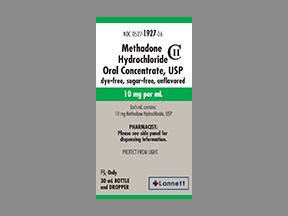
Methadone Hcl Coupons & Savings Card – Discount Prices from $89.36
Generic for: Methadone hcl intensol, Methadose, Methadose sugar-free
My prescription
Edit
1000ML of 10MG/ML, Methadone Hcl (1 Bottle)
Select pharmacy

CVS
$89.36
COUPON PRICE
Albertsons
$220.75
COUPON PRICE
Walgreens
$223.97
COUPON PRICE
Walmart
$764.00
COUPON PRICEMethadone Hcl savings card
Show this card to your pharmacist
Albertsons
$220.75
BIN
ID
PCN
GRP
015995
LHKPW465712
GDC
DR33
Powered by
More prescriptions for pain
More prescriptions for pain
Price history for Methadone Hcl Intensol (brand) & Methadone Hcl (generic)
1 Bottle, 10MG/ML
Average retail price for Methadone Hcl Intensol
Average retail price for Methadone Hcl
Average SaveHealth price for Methadone Hcl
Our price history data is based on aggregated prescription data collected from participating pharmacies in America. Our prescription data updates daily to reflect the latest price changes. If you notice a missing data point, it means there wasn't sufficient data available to generate a monetary value for that date.
We analyzed Methadone Hcl prices for (10MG/ML, 90 Bottles) over the last 12 months. The average retail price was $76.50, while the average price using the SaveHealth discount card was $66.16. That's a savings of approximately 13.52% when using our Methadone Hcl coupon.
Compared to the generic version, Methadone Hcl Intensol had an average price of $50.73 over the same time period. With the SaveHealth savings card, Methadone Hcl is -30.42% cheaper on average than Methadone Hcl Intensol.
*Retail prices are based on pharmacy claims data, and may not be accurate when we don't have enough claims.
Methadone Hcl Intensol (Methadone Hcl) dosage forms
Dosage Quantity Price from Per unit 10MG/ML 90 Concentrates $42.75 $0.47 10MG/ML 1 Concentrate $9.38 $9.38 10MG/ML 2 Concentrates $9.75 $4.88 10MG/ML 3 Concentrates $10.13 $3.38 10MG/ML 50 Concentrates $27.75 $0.56
| Dosage | Quantity | Price from | Per unit |
|---|---|---|---|
| 10MG/ML | 90 Concentrates | $42.75 | $0.47 |
| 10MG/ML | 1 Concentrate | $9.38 | $9.38 |
| 10MG/ML | 2 Concentrates | $9.75 | $4.88 |
| 10MG/ML | 3 Concentrates | $10.13 | $3.38 |
| 10MG/ML | 50 Concentrates | $27.75 | $0.56 |
